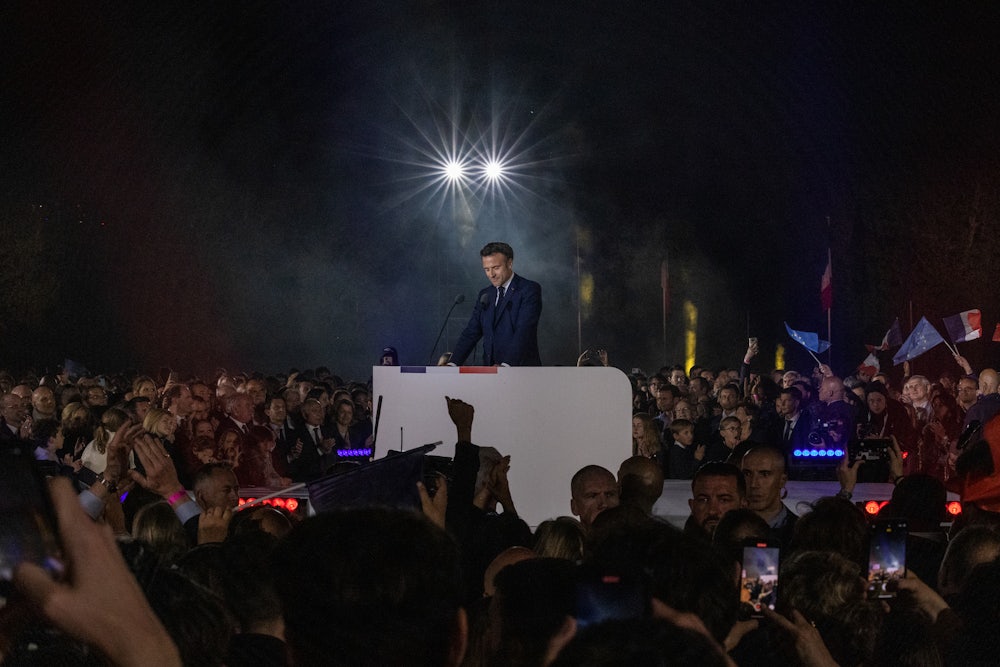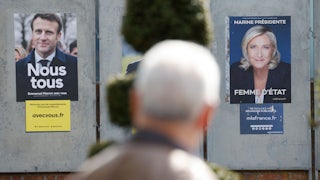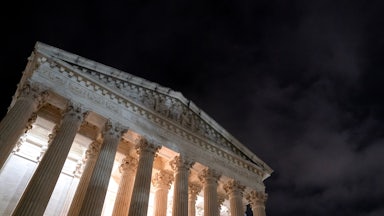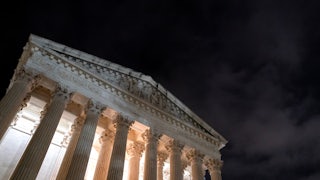In the end it wasn’t even close: Emmanuel Macron was reelected president of France with 58.5 percent of the vote. Marine Le Pen, the candidate of the far-right Rassemblement National, improved her score by a little over eight points compared to her 2017 performance, but in the end a substantial majority of French voters demonstrated that they would not allow the country to be taken over by a party whose founder once declared the Holocaust to be a mere “detail” of World War II and whose current leader promised to deny Muslim women the right to wear head scarves in public.
Despite Macron’s impressive 16-point margin of victory—a landslide by any standard—his defeated rivals seized the moment to question the legitimacy of his reelection. Le Pen, in a speech so fiery that it can hardly be called a concession, appealed to “the forgotten France of the provinces and countryside, and the overseas territories,” where her supporters outnumbered Macron’s. It was a classic populist maneuver, challenging the verdict of the polls on the grounds that the real people of France were not the democratic majority but the inhabitants of a supposedly more authentic preserve, untainted by the currents of globalization and immigration.
Le Pen declared that her “historic score”—historic only in the sense that no other candidate named Le Pen had ever passed the 40 percent threshold—entitled her to fealty from all who despised Macron, including not only those who had voted for the other right-wing parties but also those who had cast their ballots for the leftist Jean-Luc Mélenchon, the leader of France Unbowed, who came in third in the first round. “We are launching the battle of the legislatives,” she said, and called upon all of Macron’s enemies to line up behind her.
Éric Zemmour, the losing far-right candidate, was quick to declare he had no intention of heeding Le Pen’s call to subordinate his Reconquest party to her Rassemblement National. He called instead for an “alliance of all the rights” to oppose both the “globalist” Macron and the “Islamo-Leftist” Mélenchon. Unlike Le Pen, who asked Mélenchon voters to support her, Zemmour identified them as the enemy and banished them from his “National Union.”
Meanwhile, Mélenchon himself sought to delegitimize the newly reelected president by alleging that the unusually high abstention rate (28.2 percent) and elevated number of blank protest ballots meant that Macron enjoyed less citizen support than any previous president. This is factually false: Taking abstentions and blank ballots into account, Macron received the support of 42 percent of registered voters, compared with 39.4 percent for Jacques Chirac in 1995, 39 percent for François Hollande in 2012, and 37.5 percent for Georges Pompidou in 1969. Nevertheless, a France Unbowed spokesperson insisted that, in view of Mélenchon’s having finished just short of beating Le Pen in the first round, the “novelty of this election was the construction of a new ‘popular pole’” to the left of Macron, while Le Pen and Zemmour constituted a third pole on the far right. (Exit polls will arrive soon to give us a better sense of how the left voted.)
In short, the fractured political landscape that marked the presidential campaign remains unaltered as the country girds for the June legislative elections. The contest promises to be bitter, with supporters of all three defeated candidates still smarting from their wounds and Macron relishing a margin of victory that exceeded the most optimistic predictions. He will take this as a mandate to forge ahead with his reforms, despite the low turnout and the refusal of any of the losing candidates to tender anything resembling an olive branch.
After the results were announced on the stroke of 8 p.m. Paris time, the president allowed an hour to pass before leaving the Élysée Palace to deliver his victory speech on the Champ de Mars, in front of the gorgeously illuminated Eiffel Tower. This was enough time for each of his rivals to vent their wrath to the TV cameras, leaving the culmination of the evening to a victory celebration carefully planned by Macron’s handlers. The TV anchors assured the audience that while the mood might be celebratory, the president wanted the celebration to be “somber,” in keeping with Europe’s mood in this time of war in Ukraine and a Covid-19 epidemic still not entirely under control.
Upon reaching the Champ de Mars, Macron embarked upon a solemn procession to the podium, accompanied by an incongruously dirgelike rendition of the “Ode to Joy,” Europe’s anthem and a reaffirmation of Macron’s support for both the EU and embattled Ukraine. With his wife at his side, he was trailed by a small horde of children (apparently those of his staunchest supporters—he has none of his own): symbols (the audience was helpfully told by the news anchors) of his commitment to “youth, education, and health” as the primary objectives of his second five-year term. His more controversial plan to raise the retirement age to 65 went unmentioned. As the Macrons slowly made their way to the center of the crowd that had gathered to hear his speech, the Eiffel Tower gleamed in the background, perfectly centered in the frame behind the president and his children’s posse. He resembled a pied piper, leading the children of France to destinations unknown.
/ In honor of Earth Day, TNR’s climate coverage is free to registered users until April 29. Start reading now.
Once the president mounted the podium, the young people disappeared. He delivered a mercifully short speech extolling the virtues of “creativity, innovation, and ecology.” He did not forget to acknowledge that many people had voted “not for [his] ideas” but in order to “bar the way” to a Le Pen victory. For that he thanked them and vowed to remember their “anger,” to which he promised to respond with a “social and ecological” program. Such vagueness was likely to have stoked rather than assuaged their wrath, but little anger was on display in the very pro-Macron crowd. After singing along with an operatic rendition of “La Marseillaise” by a soprano wearing a vivid red gown, the still vigorous young president jumped down from stage into the warm embrace of the people he likes to call “les premiers de cordée,” the climbers at the head of the rope whose success in life, like Macron’s own, is meant to inspire and boost others still struggling their way up the slope.
Despite the patriotic kitsch, it was for much of France a night of welcome relief after weeks of anxiety wondering whether the Fifth Republic would survive—or fall into the inexperienced hands of a practiced demagogue who had run an efficient campaign fueled by rising prices, personal animosity toward Macron, and the seemingly eternal discontent of segments of the French population. Yet the perpetuation of the status quo, while it elicited an audible Gallic “Ouf!” (French for “Phew!”) that could be heard all the way from Calais to Nice, leaves the country’s deep fractures unhealed and an ominous sense that la lutte continue—the struggle continues. “I’m afraid of the third round of the election still to come,” said one TV platform talking head. When asked if he meant the legislative elections in June, he said, “No, I mean the social round—the one that will take place in the streets.” He could be right.






